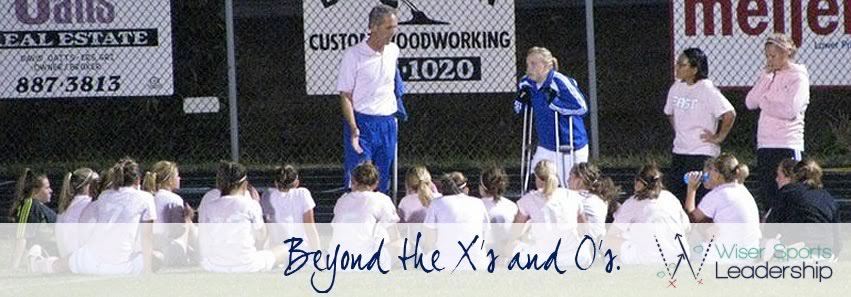The Coaching Interview, Are You Ready?
DeAngelo Wiser
The score is 0-0, two minutes to go, and you have the ball at the halfway line. Can you maneuver through six or eight defenders, confidently maintaining possession, while the crowd roars, giving yourself a shot on goal to win the game? It’s a lot of pressure, and only a prepared and skilled athlete can thrive in this situation.
What about when you’re in position to score a coaching job, not just a goal? It’s exactly the same type of pressure, with the stakes being higher when you want to win the job.
What’s an AD or Athletic Committee looking for from an aspiring head coach in an interview? How can you leave it all on the table and give yourself the best opportunity of earning a better position?
Let’s face it, a lot of coaching vacancies are filled by those with connections and big-time recommendations. In fact, some are filled before you even hear they’re open. That being said, you’ll never move forward if you don’t take chances. So, how can you help yourself when the opportunity presents itself and you’re in the interview?
- HOW CAN I PREPARE? Do as much research as possible on the history and achievements of the school or club. Be able to talk about it comfortably. Develop practice questions to rehearse with someone to build your confidence. Make sure some of the questions are challenging and tough. You need to know how to answer, “Why are you leaving your current job?” or “Why wasn’t your team successful?” Videotaping the practice interview may give you more insight on strengths, body language and areas of concern. I’ve included a list of interview questions to consider.
- HOW DO I SET THE STAGE WITH THE GREETING? When you enter the room, seek everyone out and greet them with a handshake while asking their name, leaning in and looking them in the eye. Let them know how honored you are to be there.
- ARE THERE RIGHT AND WRONG ANSWERS TO THE QUESTIONS? Not really, just be yourself. Be consistent with questions dealing with discipline and how you would handle challenging situations. Stay with the question and don’t wander off on some other subject. Trying to answer questions in a lofty way when that isn’t really you will come through as fake.
- HOW SHOULD I DRESS? Be professional looking when you show up. Remember, you’ll be the face of the program and employers want a coach who shows and acts first class. Showing up casual and unkempt will be seen as a reflection of your personality and ultimately your coaching demeanor.
- HOW DO I TALK/ACT? Stay focused, scanning the room and making eye contact with everyone as you answer questions. Make an effort to keep them involved by saying, “I know you’ve experienced that situation as well.” Be respectful of everything you say and do. Refrain from talking ill of the previous coach. Only speak in terms of what you can do. Don’t mention the challenges you had with your last team in a negative way, or make excuses.
- HOW LONG SHOULD I SPEAK ABOUT MYSELF? Speak confidently and proudly with some humility mixed in. Be sure not to go on and on about what you’ve done. They’re more concerned with what you can do for them. Mention those who’ve helped you such as assistant coaches, administrators, parents and outstanding players.
- SHOULD I HAVE A PRESENTATION WITH MY PLANS FOR THE TEAM? Absolutely! It shows you’ve done your homework and already have a detailed plan to start today with your new team. Include the team’s logo throughout. The readiness and passion to start tomorrow is what they want. This is always impressive to interviewers.
- WHAT ABOUT MY LACK OF SUCCESS? Always be honest. If your success isn’t or hasn’t been where you wanted it to be, let them know your plans and what you plan to accomplish. Point out progress and successes that may not be apparent in the win-loss record. Let your passion to succeed shine. Be proud that you’ve worked hard, and continue to strive to achieve your goals.
- WHAT WOULD INDICATE A LACK OF INTEREST IN ME? You’ll be able to get a real feel for interest in you, early in the interview. When interviewers start looking at each other waiting for someone else to ask a question or they don’t seem to be paying attention, it may be a lack of interest. Another indicator may be the fact they’re interviewing two candidates at the same time. This is a very uneasy situation, and they may be doing this to save time by running through candidates quickly. In my opinion, it’s not a very professional thing to do and is an indication of how they run their sports program.
- WHAT ABOUT FOLLOWING UP? Ask about the time frame for filling the job, and when they plan on contacting those interviewed. It’s always a good idea to call or email them the next day and thank them for taking the time to interview you. As you leave, walk around the room and shake hands again. Let them know if they have any questions they can contact you. If the deadline time passes with no contact, call them.
- IS IT A GOOD IDEA TO INTERVIEW FOR SEVERAL JOBS AT THE SAME TIME? It can be a negative, especially since most AD’s know each other and communicate frequently. They may feel you’re job shopping and don’t take theirs seriously. It can also be a distraction to be thinking of so many programs and keeping your information straight. Do your best to, at least, narrow it down to your top two.
- SHOULD I ASK THEIR VISION OF THE NEW COACH? It simply may not match what your expectations are, and it may not be possible to do so. If this is the case, let them know early.
- SHOULD I ASK ABOUT THE SALARY? Research the job first to see what it pays before the interview. You have to know if you can afford to make a job change from a personal standpoint. If you’ve done your research, you might say at the end of the interview, “I understand the salary for this position is ___________. Is that correct?” If it’s a negotiable salary, wait until an offer has been made or until they bring it up during the interview.
I’ve taken for granted this is a meet and greet interview allowing you to sit in front of or across from the hiring committee. I do know some schools or institutions have used phone or media interviews. Those are essential especially in the case of a candidate or candidates who live a long distance away, or just can’t be there in person. I will say if that’s the case, those are the toughest. You aren’t able to scan the room, make eye contact or gauge the atmosphere or feelings of those on the committee. It also doesn’t allow them to see your passion, or expressions of determination as you explain why you’re right for the job. Be sincere with your answers, showing through your voice all that shines in your ability and personality. Stay engaged by asking for clarifications or make a point to ask questions back to committee members to keep the dialog moving smoothly.
Interviews can seem contrived, and certainly may miss something important that you feel is significant. Questions may have very little to do with who you are, and your ability to lead a team. If that’s the case, share information you want the interviewers to know at the end of the interview.
You may get a sense that the position is already filled. Committee members that aren’t paying attention or seem distracted and bored are good indicators. Or it could be you lost their attention with an answer on the last question. If you feel that’s the case, stop and go back, ask for a clarification of the question and either explain your answer in more depth, or give a new answer based on the clarification.
Having been on both sides of the interview table, my recommendation is to just relax, be yourself and let the committee see you’re the right person for the job. Allow your confidence to show, and be genuine in everything you say.
Nothing will guarantee you get the job, but think about all the attributes you want your players to have: Persistence, Character, Integrity, Loyalty, Work Ethic, Determination, and Relentlessness. Those are all the things you want to come across as you talk to the committee.
If this job doesn’t work out, be persistent. Never lose that passion and continue to work toward your dream.
Here are a number of questions that may arise during a job interview.
- What qualifies you for this job?
- How will you deal with an angry parent after a game?
- Define your coaching style in three words.
- Describe a typical practice session for your team during the season.
- Why are you leaving your current position?
- Do you have expectations for your players? What are five?
- What will give us an indication that you had a successful season?
- Where does your coaching passion come from?
- What have you used in the past to motivate your players?
- Describe your best game and why. Your worst game/moment and why.
- What role will your assistants have?
- Your best player breaks a rule before a big game. How do you deal with it?
- What are your strong coaching areas? Your areas of concern?
- What do you hope your players take with them after they graduate?
- How will you deal with your team after a heartbreaking loss?
- What’s your philosophy with respect to parents?
- Several players complain about a certain player. How do you deal with it?
- What specifically will you do to challenge your players?
- How will you determine the leaders of your team?
- What are three personal coaching goals you want to achieve?
- What is your definition of character?
- What are three words your colleagues would use to describe you?
- Why should we hire you?

